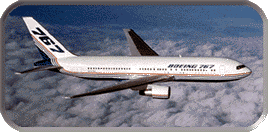
 |
   |

Production design of the fuel-efficient, medium-to-short range twinjet began in 1978 when United Airlines
placed an order for 30 aircraft. The first
767-200, designed to be the first wide-body aircraft to
fly short and medium routes, was delivered to United in
mid-1982. The larger 767-300 series was launched in
1983 and the first airplane was delivered to Japan
Airlines in September of 1986. Following the release
of both the 200 and 300 series, an extended range
version of each was developed to allow the plane to
service longer routes. As of 1996, the 591 767s in
service had carried 795 million passengers on 4.8
million flights and today, the 767 crosses the Atlantic
more than any other airplane type.
William E. Boeing produced his first two B&Ws (a single-engine seaplane) in 1916 and the following year, the U.S. Navy ordered 50 of Boeings next model (the two-seat model C trainer) to serve in World War I.
Boeing continued to make airplanes, both commercial and
military, producing such famous models as the Pan
American "Clipper" flying boat and the "Stratoliner"
(first pressurized cabin). In World War II, Boeing
became an integral part of the allied effort by
building the B-17 and B-29 bombers.
|
|
|